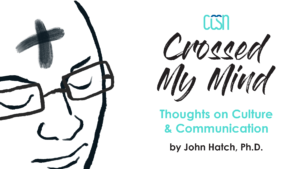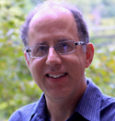 Column title: Crossed My Mind: Thoughts on Culture and Communication
Column title: Crossed My Mind: Thoughts on Culture and Communication
Column entry: The Fundamental Political Choice: Fear or Love?
By John Hatch, Ph.D.
Eastern University (retired)
CCSN Senior Fellow
Column Description: As Christians, we are called to have the mind of Christ. This goes against the grain of our social and cultural conditioning. We seek personal or political advancement; Christ seeks the lost and the least. We grasp for cultural ascendency; Christ descends to the cross of love. This column is dedicated to thinking about culture and communication under the sign of the cross.
September 2024 / August 2024 / June-July 2024 / May 2024 / April 2024 / March 2024 | February 2024(2) / February 2024(1) / January 2024 / December 2023 / November 2023 / October 2023 / July 2023 / June 2023 / May 2023 / April 2023 / March 2023 / February 2023 / January 2023 / December 2022 / November(2) 2022 / November 2022 / October 2022 / August-September 2022 / June-July 2022 / January 2022 / December 2021 / October-November 2021
September 2024
The Fundamental Political Choice: Fear or Love?
Last month’s column explored the “jazz factor” in Christian theology and communication: love. In this election season, rife with fear on all sides, love is desperately needed in our hearts, minds, words, and actions. With that in mind, I highly recommend a song released a few years ago by guitar virtuoso and CCM pioneer/veteran Phil Keaggy.[i] If you don’t have time to read a whole column right now, just listen to Fearless Love, and let Keaggy’s pithy lyrics and bold blues-rock guitar licks challenge and lift you up.
If you’re still reading, let’s face the elephant in the room. Much of the fear regarding election 2024 is warranted. I must confess that I fear for our democracy, and some nights it keeps me awake. You may feel just as fearful; and in this polarized age, there’s a good chance your fear is the reverse of mine: that those whom I see as champions or servants of a healthy democratic republic appear to you as enemies or abettors, and vice versa. Perhaps both our fears are warranted to some degree, and we’re just focusing on different parts of the elephant. But there’s also a great deal of unwarranted fear going around, based on lies, distortions, demonization, and conspiracy-mongering. The more fearful we become, the more open we are to believing the worst about the Other Side—and the more closed we become to countervailing evidence. Indeed, we do our worst thinking when we’re afraid.
Christians, of all people, should not fall prey to fear-based thinking. We are called to take on the mind of Christ, marked by a heart of love and faith in the Father. “For God has not given us a spirit of fear, but of power and of love and of a sound mind” (2 Timothy 2:17, NKJV). While there is much to fear in a fallen world, divine love is greater. “There is no fear in love; but perfect love casts out fear,” John writes.[ii] But our fears will not be overcome if we soak ourselves in the rhetoric of those who sell fear to gain power (or raise money). As Paul exhorts us, “do not be conformed to this world, but be transformed by the renewing of your mind” (Romans 12:2, NKJV). (I’m preaching to myself here.) We must baptize our minds in the Spirit of Christ, who is love and gives his life to reconcile us, not only to God but also to one another, including enemies. “For he himself is our peace, who has made the two groups one and has destroyed the barrier, the dividing wall of hostility.”[iii]
The love of God is steadfast; but we turn aside from it all too easily. Under the influence of Christian culture-war rhetoric and ideologically aligned 24/7 cable news, many avowed Bible-believing Christians now appear to have greater faith in worldly power than Christ’s upside-down kingdom, at least when it comes to influencing their society. Christianity Today editor Russell Moore reports his experience of “having multiple pastors tell me essentially the same story about quoting the Sermon on the Mount parenthetically in their preaching—turn the other cheek—to have someone come up after and to say, where did you get those liberal talking points? And what was alarming to me is that in most of these scenarios, when the pastor would say, I’m literally quoting Jesus Christ, the response would not be, I apologize. The response would be, yes, but that doesn’t work anymore. That’s weak.”[iv]
It’s a psychological truism that we become whatever we dwell on. Adults who fixate on the damage caused by their parents’ alcoholism tend to become alcoholics themselves. The abused often become abusers, unless they have worked through their pain and freed themselves from bitterness. You cannot overcome hate with hatred; only love can do that.
The same is true on a collective scale. If we fixate on the Other Side, magnifying their faults and losing sight of their redeeming qualities, we will become like the devilish image we fear. Caricaturing them as oppressors, we will entertain oppressive policies to keep them at bay. Obsessed with their bias, we will develop an even greater bias in reaction, losing the capacity to think fairly. Demonizing them as People of the Lie, we will start to believe and spread dangerous falsehoods in the name of defeating evil.
This is why Paul writes, “Do not be overcome by evil, but overcome evil with good.”[v] In this context, being overcome by evil can’t mean being persecuted or marginalized; for Paul says elsewhere, “for Christ’s sake, I delight in weaknesses, in insults, in hardships, in persecutions, in difficulties.”[vi] And Christ called his followers to take up their cross and follow him,[vii] with the following assurance: “Blessed are you when people insult you, persecute you and falsely say all kinds of evil against you because of me. Rejoice and be glad, because great is your reward in heaven, for in the same way they persecuted the prophets who were before you.”[viii]
Clearly, then, what Paul means here is don’t succumb to the logic or spirit of evil—the temptation to hate one’s enemies, oppress one’s oppressors, and sacrifice truth, goodness, and integrity to gain power. That is what Christ overcame when he resisted Satan’s invitation to seize authority over the kingdoms of the earth by intrigue or force in the name of being Israel’s Messiah. The ultimate triumph over evil was achieved when he surrendered himself to crucifixion instead of raising a rebellion against the Roman oppressors. In him, God’s goodness took an evil act and turned it to good,[ix] as Christ shed abroad his life for the redemption and restoration of all. Going to the cross seemed a weak and foolish thing to do; but “the foolishness of God is wiser than human wisdom, and the weakness of God is stronger than human strength.”[x]
The Lord of the Rings gives us a beautiful illustration of this truth. The One Ring encapsulates the allure of absolute power; and when leaders of Middle Earth’s free peoples fear conquest by the ring’s maker, Sauron, they are tempted to take the ring for themselves as the means to defeat genuine evil. However, the ring cannot destroy evil, for it is the very power of evil, imbued with the spirit of Sauron; it corrupts everyone who tries to use it, enslaving them to his will.
The only way to defeat Sauron is to utterly forswear the ring of power, consigning it to the flames in which it was forged—an act of apparent weakness and folly. And this is what the story’s heroes—simple hobbits—are willing to attempt, because they trust in Providence more than power. Though weak and lowly, Frodo and Sam choose the path of fearless love. Not that they feel no fear in the face of great evil—indeed, they’re terrified—but they act on their love of goodness and fellowship rather than their fear. They confront evil not with power but with love.
We face the same choice. Will we succumb to evil in the name of stopping apparent evil? Will we become a reverse image of the thing we fear? Or will we dwell on Christ, being informed by his mind and conformed to his image as we confront untruth and injustice?
Will we be ruled by fear, or love? That’s the fundamental political choice.
* The views of any CCSN columnists are their own, and do not necessarily represent the views of the CCSN. We invite and embrace a wide range of views and critiques on important communication and cultural issues from a Christian perspective. The CCSN is a community of Jesus followers who study communication. We do not support or promote a particular social, political, or denominational agenda.
Notes
[i] In case you’re not familiar, CCM stands for Contemporary Christian Music. It’s important to note that Keaggy’s music predates, post-dates, and transcends that marketing label/genre, however.
[ii] 1 John 4:18a, NKJV.
[iii] Ephesians 2:14.
[iv] “Russell Moore on ‘an altar call’ for Evangelical America,” NPR, 5 August 2023, https://www.npr.org/2023/08/05/1192374014/russell-moore-on-altar-call-for-evangelical-america.
[v] Romans 12:1, NIV.
[vi] 2 Corinthians 12:10, NIV.
[vii] Matthew 16:24.
[viii] Matthew 5:11-12, NIV.
[ix] Genesis 50:20;
[x] 1 Corinthians 1:25, NIV.

